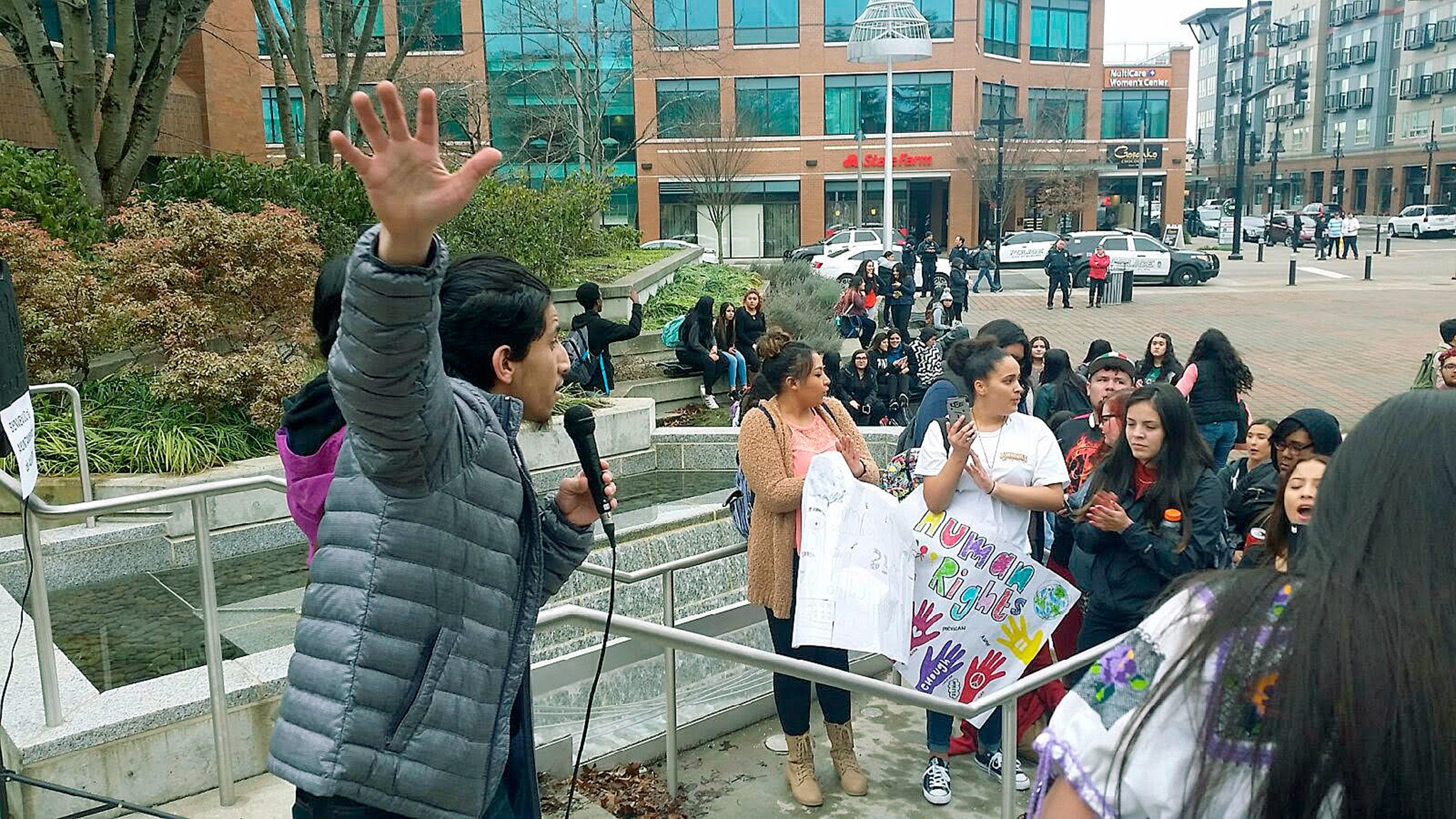They filled Auburn City Hall Plaza with impassioned demands.
And what the crowd of some 70 students who had walked out of Auburn High School last Friday afternoon – most of them from undocumented families – and marched west along Main Street to City Hall wanted was for Auburn to declare itself a “sanctuary city.”
That is, to adopt a policy that protects undocumented immigrants from prosecution for violating federal immigration laws in the country in which they are now living illegally.
“We just want to stand with you all and fight for this sanctuary city for here and for families across the world to have a place to live,” activist Bryan Rivera told the crowd.
“When do we want it? Now,” the crowd roared.
Listening in the plaza below was Rosio Carranza, who volunteers “to help underrepresented communities” in Seattle get into higher education and had come south to support the walkout.
“I just saw the need for a sanctuary city, and I used to work with the youth here,” Carranza explained. “Most of the students here come from undocumented families, and now Burien is a sanctuary city, and it’s important that law enforcement will not have the power to ask someone based on their race for their papers or documentation, and you separate ICE (U.S. Immigration and Customs Enforcement) from the police.”
City of Burien Ordinance 651, adopted Jan. 9, does not use the term “sanctuary city;” it merely adds a chapter to that city’ code “relating to ascertaining immigration status as it relates to the public health and safety of the residents” of Burien.” It forbids police officers there from inquiring at the time of a stop or arrest about one’s immigration status, but avoids the hot-button phrase.
Auburn Mayor Nancy Backus had hoped to let the students know she intended “to bring language forward” to the City Council study session on Monday to start a discussion. But when she tried to address last Friday’s crowd, she was shouted down.
Backus said later she had met with some of the students about a month-and-a-half earlier and commended them for their ability to rally and to support their cause.
“As you heard from some of their rallying cries today, they don’t want anything but a sanctuary city. My responsibility is to bring language to the council. It’s council’s decision what to do. But it’s also my responsibility to keep people safe in our city,” Backus said.
Backus’ principal concern is that should the new administration in Washington, D.C., carry through on a campaign vow to pull federal funding from sanctuary cities, Auburn if so self-proclaimed would be in a world of hurt.
“If they pull federal funding because we are a sanctuary city, that specific language,” Backus said, “that means our Community Development Block Grant funding could go away. That means our road funding could go away. We are talking about millions of dollars a year. I’m responsible for the well being of the entire city. I want to work with the students. We need to do something and ‘welcoming city’ is a good place to start.’ ”
When Backus brought her draft ordinance forward, no one wanted to bite on the politically-charged phrase “sanctuary city,” aware that adopting it could put the money Auburn receives from the federal government at risk.
Council then talked about incorporating some of the language Burien adopted on Jan. 9, and considered the phrase “welcoming city,” instead of “sanctuary city. But consensus was “welcoming city” would be another phrase for the same thing. In fact, the Burien ordinance does not use the phrase “welcoming city” either.
Councilman Rich Wagner noted that many years ago the City of Auburn began to use the phrase “inclusive city;” indeed, it endures to this day on City signs. Council members then asked staff to find the language in the original ordinance or resolution and bring it to a future study session for consideration.
Auburn Police Chief Bob Lee said that his officers do not inquire about one’s immigration status; instead, they stick strictly to enforcing city and state law. But once an officer enters someone’s name in the local system post arrest – necessary for purposes of setting a trial date and to fulfill other legal requirements – the federal government is able to view it.
Lee said that should the feds come to Auburn to pick somebody up for an warrant on an immigration violation, police here would offer their support.


